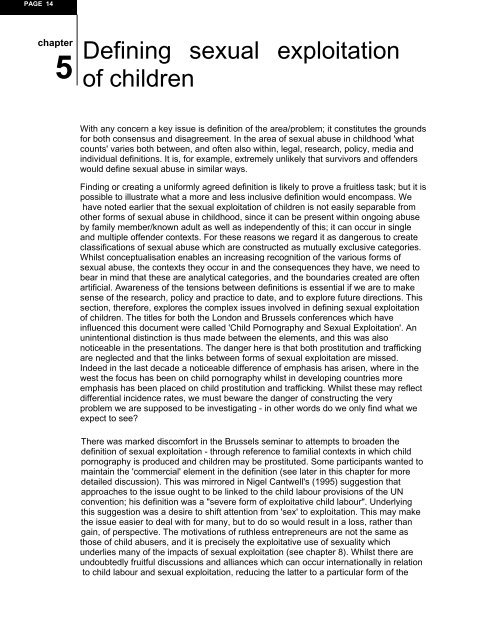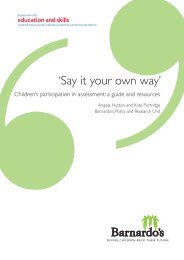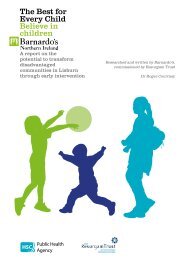Splintered Lives - Barnardo's
Splintered Lives - Barnardo's
Splintered Lives - Barnardo's
You also want an ePaper? Increase the reach of your titles
YUMPU automatically turns print PDFs into web optimized ePapers that Google loves.
PAGE 14<br />
chapter<br />
5<br />
Defining sexual exploitation<br />
of children<br />
With any concern a key issue is definition of the area/problem; it constitutes the grounds<br />
for both consensus and disagreement. In the area of sexual abuse in childhood 'what<br />
counts' varies both between, and often also within, legal, research, policy, media and<br />
individual definitions. It is, for example, extremely unlikely that survivors and offenders<br />
would define sexual abuse in similar ways.<br />
Finding or creating a uniformly agreed definition is likely to prove a fruitless task; but it is<br />
possible to illustrate what a more and less inclusive definition would encompass. We<br />
have noted earlier that the sexual exploitation of children is not easily separable from<br />
other forms of sexual abuse in childhood, since it can be present within ongoing abuse<br />
by family member/known adult as well as independently of this; it can occur in single<br />
and multiple offender contexts. For these reasons we regard it as dangerous to create<br />
classifications of sexual abuse which are constructed as mutually exclusive categories.<br />
Whilst conceptualisation enables an increasing recognition of the various forms of<br />
sexual abuse, the contexts they occur in and the consequences they have, we need to<br />
bear in mind that these are analytical categories, and the boundaries created are often<br />
artificial. Awareness of the tensions between definitions is essential if we are to make<br />
sense of the research, policy and practice to date, and to explore future directions. This<br />
section, therefore, explores the complex issues involved in defining sexual exploitation<br />
of children. The titles for both the London and Brussels conferences which have<br />
influenced this document were called 'Child Pornography and Sexual Exploitation'. An<br />
unintentional distinction is thus made between the elements, and this was also<br />
noticeable in the presentations. The danger here is that both prostitution and trafficking<br />
are neglected and that the links between forms of sexual exploitation are missed.<br />
Indeed in the last decade a noticeable difference of emphasis has arisen, where in the<br />
west the focus has been on child pornography whilst in developing countries more<br />
emphasis has been placed on child prostitution and trafficking. Whilst these may reflect<br />
differential incidence rates, we must beware the danger of constructing the very<br />
problem we are supposed to be investigating - in other words do we only find what we<br />
expect to see?<br />
There was marked discomfort in the Brussels seminar to attempts to broaden the<br />
definition of sexual exploitation - through reference to familial contexts in which child<br />
pornography is produced and children may be prostituted. Some participants wanted to<br />
maintain the 'commercial' element in the definition (see later in this chapter for more<br />
detailed discussion). This was mirrored in Nigel Cantwell's (1995) suggestion that<br />
approaches to the issue ought to be linked to the child labour provisions of the UN<br />
convention; his definition was a "severe form of exploitative child labour". Underlying<br />
this suggestion was a desire to shift attention from 'sex' to exploitation. This may make<br />
the issue easier to deal with for many, but to do so would result in a loss, rather than<br />
gain, of perspective. The motivations of ruthless entrepreneurs are not the same as<br />
those of child abusers, and it is precisely the exploitative use of sexuality which<br />
underlies many of the impacts of sexual exploitation (see chapter 8). Whilst there are<br />
undoubtedly fruitful discussions and alliances which can occur internationally in relation<br />
to child labour and sexual exploitation, reducing the latter to a particular form of the
















